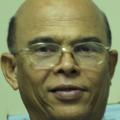U.N. must be tough on Burma's dictators
By Zin Linn
Column: Burma Question
Published: December 08, 2008
Bangkok, Thailand — This month marks the 60th anniversary of the adoption of the Universal Declaration of Human Rights. Communities, organizations and governments around the world will celebrate U.N. Human Rights Day on Dec. 10.
Article 9 of the declaration states: “Everyone has the right to liberty; any detention must be lawful and should be used only as a last resort.” This article may seem strange to the people of Burma, however. In the military-ruled country, even possessing a booklet containing the Universal Declaration of Human Rights could send one to jail for several years. To people’s disappointment, Burma is still lacking in human rights education and practices.
No one is under any illusion about the willingness of Burma’s military regime to ruthlessly take action against challengers who are tired of the military dictatorship. Nonetheless, the sentences handed down on 14 protesters on Nov. 11 were shockingly harsh.
Thet Zin and Sein Win Maung, respectively editor and manager of the privately-owned Myanmar Nation Journal, were sentenced by a summary court in Rangoon on Nov. 28 for being in possession of dissenting documents, including a U.N. Special Rapporteur’s Human Rights report on Burma.
These sentences are typical of Burma's military regime, which has been ignoring calls from the international community to improve its human rights record. These retributions also contradict the junta’s claim that its new Constitution and electoral procedure for 2010 prove the effort it is making toward political change.
The release of all political prisoners is a vital step toward national reconciliation, but the regime’s current stance is still backward-looking. It continues to defy the presidential statement by the U.N. Security Council on Oct. 11, 2007, calling for the release of all political prisoners in Burma. The U.N. Security Council needs to take concrete action to secure their release, without further delay. These recent sentences are some of the harshest punishments handed out by the regime since 1988.
At least 215 Burmese political activists were sentenced in November alone, according to a report released on Dec. 1 by the Assistance Association for Political Prisoners (Burma). The first trial of activists arrested in connection with last year’s uprising in August and September began on Oct. 8, 2007. Since then, at least 384 protesters have been sentenced, over half of them in November, confirming recent reports that the regime plans to speed up trials of political dissenters.
The ugliest abuse of power is the junta’s dissolution of justice. The sentences recently handed down have ranged from four months on charges of “contempt of court” for National League for Democracy lawyers U Khin Maung Shein and U Aung Thein to life imprisonment plus eight years for Human Rights Defenders and Promoters network founding member U Myint Aye, on explosives charges.
Former political prisoner and well-known comedian Zarganar, arrested for his efforts to coordinate volunteer relief efforts after Cyclone Nargis hit in May this year, received sentences totaling 59 years. All Burma Monks’ Alliance leader U Gambira, who played a leading role in last year’s Saffron Revolution, was given sentences totaling 68 years. Twenty-three members of the 88 Generation Students Group, who led the protests against fuel price hikes in August last year, were handed sentences of at least 65 years each.
Meanwhile, on Dec. 3, a letter signed by 112 former presidents and prime ministers – including former U.S. presidents George H.W. Bush and Jimmy Carter, former British prime ministers Tony Blair, Margaret Thatcher and John Major, former Soviet leader Mikhail Gorbachev, former Japanese Prime Minister Junichiro Koizumi and former Polish President Lech Walesa – urged U.N. Secretary-General Ban Ki-moon to return to Myanmar and pressure the military junta to free all political prisoners. The letter, an effort led by former Prime Minister Kjell Magne Bondevik of Norway, said Ban should make good on the Security Council's call in Oct. 2007 for Burma to release the prisoners, including Nobel Peace Prize winner Aung San Suu Kyi.
Two days later, on Dec. 5, another public letter signed by 241 parliamentarians from eight Asian countries – South Korea, Thailand, Cambodia, Japan, Malaysia, the Philippines, Singapore and Indonesia – was sent to Ban, urging him to obtain the release of all political prisoners from Burma by Dec. 31. This letter expressed the parliamentary members’ concerns about the lack of progress in Myanmar’s human rights situation.
“It is important that Secretary General Ban Ki-moon travel to the country himself and engage in serious dialogue with the military regime and impress on them the calls by leaders and lawmakers from Asia and around the world for the release of all political prisoners,” said Kraisak Choonhavan, president of the ASEAN Inter-Parliamentary Myanmar Caucus, who hosted the petition.
“The suffering of the people must not be allowed to continue and the world can no longer sit idly by and only assist them when there is a devastating natural disaster,” he added, in a separate cover letter to the U.N. secretary general.
Despite the fact that Burma has intensified the tempo of imprisoning political opponents, human rights defenders, bloggers and journalists, Ban met with his “Group of Friends on Myanmar” on Dec. 5. Afterwards, he told the media that he will only go to Burma if there are positive steps by the Than Shwe regime, including the release of political prisoners.
(Note: You can view every article as one long page if you sign up as an Advocate Member, or higher).





